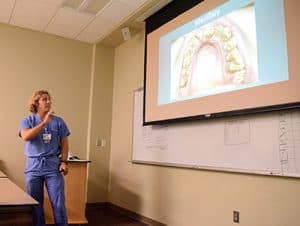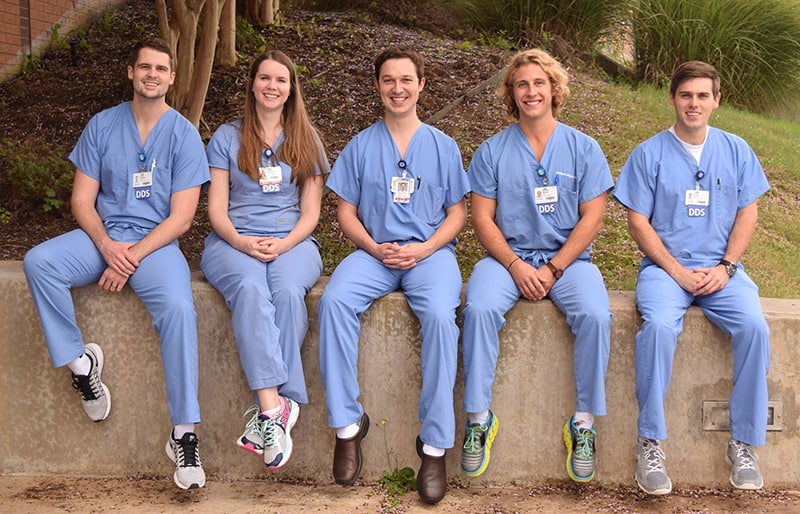Dental Residents Gain Valuable Experience at UAMS
| Jan. 9, 2017 | For UAMS’ five dental residents, the past six months have provided them with countless learning experiences.
The dental residency program, classified as a hospital-based General Practice Residency, is a one-year program that offers advanced training, specifically of patients with weak immune systems or significant health issues, beyond what is available in dental school.
The residents — Chad Adams, D.D.S., Alyssa Brailsford, D.D.S., Jack Pardo, D.D.S., John Scott, D.D.S., and William Wilson, D.D.S. — started their residencies July 1. They are UAMS’ second class of dental residents.
The residents treat patients at UAMS’ Delta Dental of Arkansas Foundation Oral Health Clinic, Arkansas Children’s Hospital, the 12th Street Health and Wellness Center and Harmony Health Clinic in Little Rock. They also complete two-week rotations through anesthesiology, emergency medicine, internal medicine and otolaryngology, as well as four weeks at Arkansas Children’s Hospital. The residents also spend time in the operating room determining whether a patient has any dental issues that would cause complications to surgery, radiation or chemotherapy.

Dental resident William Wilson, D.D.S., shows pictures of the teeth of a patient he is treating for amelogenesis imperfecta, a disorder that affects tooth development. Wilson was presenting the case to his fellow residents and faculty from the Center for Dental Education.
“We try to load the residents up with the bear cases, such as difficult extractions or rare dental issues, so when they leave here, they’re prepared for anything,” said Gene Jines, D.D.S., director of the Center for Dental Education in the College of Health Professions.
Unlike physicians, dentists are not required to complete a residency program in order to practice. According to the American Dental Association, 5,491 dentists graduated from dental school in 2014. That same year, 1,070 dentists completed residency training.
UAMS’ program is one of 184 in the country and the only one in Arkansas.
Patients with weakened immune systems include those who are undergoing chemotherapy or have an underlying disorder that affects their immune systems and are referred to as medically compromised.
For Ashley McMillan, D.D.S., an assistant professor in the College of Health Professions who spent a year in private practice before serving a residency at UAMS last year, an absence of advanced training meant she often felt she lacked the medical knowledge to treat many of her medically comprised patients. Now, she is helping train the five residents who make up the 2016-2017 class.
“This program gives you the confidence to treat more comprehensively,” she said. “You aren’t just treating the mouth. You don’t just feel qualified to handle the oral cavity. You feel qualified to look at a patient and help with their overall health.”
Niki Carter, D.M.D., associate professor in the College of Health Professions, the residency program and clinic director, agreed that a residency provides an invaluable experience.
“Completing a residency assists new dentists in the transition from academics to real world dentistry,” Carter said. “The education opportunities for dental residents at UAMS are multifaceted: Dentists provide treatment of commonly encountered oral health conditions as well as preventive care in our oral health clinic. Specifically, we train residents to provide care for a variety of patients, including special needs and the medically compromised. We clear UAMS patients for their necessary life-saving treatments for organ transplants, chemotherapy, radiation treatments, joint replacements and cardiology surgery.”
“When you graduate dental school, you know just enough to get started,” she said. “Experts estimate that a dentist who goes through a residency program has five years of experience on their peers.”
That desire for more knowledge and experience prompted this group of residents to seek out the UAMS program.
“I wanted to further my dental education beyond what is traditionally taught in dental school. At UAMS we are able to learn about the latest practices and technology with the goal of incorporating those aspects into our careers after the residency,” said Scott.
Brailsford wanted to be more equipped to care for elderly patients.
“In dental school, I really enjoyed working with the geriatric community,” she said. “Most of these patients are medically compromised and on many medications. I chose to attend a residency program because I want to be able to properly manage them.”
Adams wanted more experience treating medically compromised patients, although he acknowledges that seeing people suffering can be one of the most difficult parts of the job.
“Seeing patients with debilitating diseases who go through so much in an attempt to become healthy is not easy for me,” he said.
The residents’ rotations in different disciplines do more than simply expose them to that field of practice, said Jines.
“Residents learn how to communicate with the medical community and vice versa,” he said. “UAMS is a big proponent of interprofessional education — and we’re right in the middle of it.”
Both Pardo and Wilson said they enjoy the opportunity to collaborate on cases with various departments throughout the hospital, which allows them to give their patients the best care and increase their own medical knowledge.
“Being in a hospital setting exposes you to a wide range of medical conditions you would probably never see in a private practice dental setting,” said Pardo. “Hospital dentistry creates its own challenges, but it is extremely rewarding to be able to provide care that patients would otherwise not be able to obtain.”
Upon completing their residency, the dentists will be able to apply for hospital privileges wherever they decide to practice, said Jines, adding that he hopes some of the residents will decide to stay in Arkansas.
“The object of our program is ultimately to recruit more advanced trained general dentists into our state workforce,” he said.
